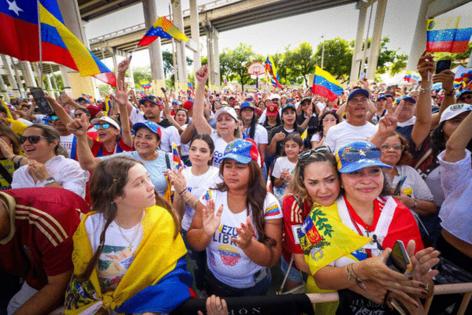Joy, pride and hope: Venezuelans in South Florida celebrate Machado's Nobel Peace prize
Published in News & Features
For Venezuelans in South Florida who fled political repression and persectution in their home country, the dream of a democratic transition felt closer than ever on Friday: Opposition leader María Corina Machado was awarded the Nobel Peace Prize, and across Venezuela and throughout the diaspora the emotions were the same: joy, excitement, pride — and above all, hope.
“It is a well-earned recognition and a great source of pride for the Venezuelan people,” said Liduzka Aguilera, a Venezuelan who has been living in the U.S. since 2018 after fleeing persecution in her home country for her work as an attorney. “She has represented us for decades, showing the world the reality of Venezuela. It’s the right time to honor her, especially now, when our community faces prejudice for having emigrated to the United States.”
Aguilera, 54, who works as a paralegal and lives Doral, home to the largest Venezuelan community in the U.S., added: “If anyone has doubts, they only need to look at our history and see that there are far more good Venezuelans than bad.”
The Nobel Peace Prize is often awarded to activists and political figures who lead struggles against authoritarian regimes, recognizing their perseverance and encouraging their cause. Machado received the award 15 months after the Venezuelan opposition participated in a presidential election from which she was barred from running. Her chosen candidate, Edmundo González Urrutia, defeated strogman Nicolás Maduro, according to voting records, but Maduro claimed victory nonetheless and cracked down harshly on protesters and the opposition.
Since the election, Machado has gone into hiding to avoid arrest, while González Urrutia has been forced into exile, a fate shared by many Venezuelans over the past two decades.
Today, Venezuela has the largest population of exiles in the Americas and the second largest in the world after Syria — despite not being in a civil war — with more than 8 million people living abroad.
One of them is Katiuska Villegas, a former Miami resident who moved to Austin, Texas, due to the high cost of living in Florida. Villegas said there could not be a more deserving person than Machado to receive the Nobel Peace Prize.
“She is a brave, intelligent, and strategic woman, a true example of resilience,” said Villegas, a computer engineer in Venezuela who now works in investment trading. “Machado has dedicated her life to fighting for Venezuela’s freedom, risking her own life with admirable determination.”
Villegas, 38, is among the many Venezuelans in the U.S. who have a family member in immigration detention, after the Trump administration revoked Temporary Protected Status for Venezuela, claiming that conditions in the country had improved. Her brother, Freddy Villegas, has been detained for more than three months since the program ended, despite having a pending asylum case. He crossed the U.S.-Mexico border, like many Venezuelans seeking freedom after being forced to flee their home country.
She said she is happy that Machado, not Trump, received the Nobel Peace Prize.
At El Arepazo Venezuelan restaurant in Doral on Friday, diner Alejandro Márquez said he “woke up to good news.” Originally from Maracaibo, Márquez, 63, who now lives in Doral, expressed joy over what he described as a historic moment. “Today we celebrate an event that fills all Venezuelans with pride — the awarding of the Nobel Prize to our fundamental leader, María Corina Machado, who has fought for the freedom of all Venezuelans at every level,” Marquez said. For Marquez the prize stands for peace, democracy and freedom and said it sets an example for other Latin American countries that facing similar circumstances as Venezuela. “This is a struggle between good and evil,” he said. “We’ve been fighting to preserve democracy, freedom and peace…that’s the main goal.”
Other Venezuelans in South Florida expressed similar feelings, emphasizing Machado’s long-standing commitment to peaceful political change.
Adelys Ferro, executive director of the Venezuelan American Caucus, a nonprofit organization, said the phrase that best captures Machado’s decades-long fight for a democratic transition in Venezuela is “ballots over bullets.”
Ferro, a Venezuelan activist in the U.S. who has fought for TPS for Venezuelans, said Machado’s fight for democracy has never stopped. “Hers is a democratic struggle — the struggle of a Venezuelan woman who represents all of us in the pursuit of freedom and democracy,” she said. “In the words of the Nobel Committee, this award sends a message to all authoritarians around the world, at a time when democracy is in retreat.”
That sense of pride and recognition was shared by many Venezuelans in South Florida
Rafael Pineyro, a Venezuelan-American council member in Doral, said he celebrated with “deep pride” the Nobel Committee’s award to Machado.
“This recognition sends a clear message to the world: the fight for freedom, democracy, and the dignity of the Venezuelan people has not been in vain,” Pineyro said. “From Doral, a city that welcomes thousands of Venezuelans, I reaffirm my commitment to the values she embodies: courage, truth, and hope.”
He added: “We look forward to the day we can celebrate the full restoration of democracy in Venezuela.”
-----------
—Miami Herald staff writer Milena Malaver contributed to this story.
©2025 Miami Herald. Visit at miamiherald.com. Distributed by Tribune Content Agency, LLC.







Comments